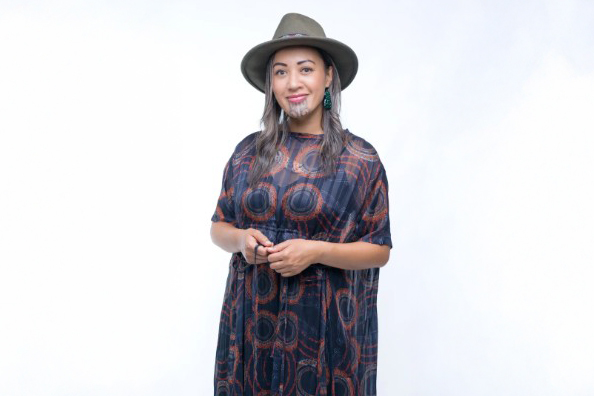Cydne Price has a message for anyone studying Toi Māori: don’t focus on the little things, it’s better to look at the bigger picture.
At 19, Cydne initially enrolled in the Level 4, 38-week Toi Ataata Visual arts programme at Toimairangi at Te Wānanga o Aotearoa in Heretaunga (Hastings), even though “art wasn’t my thing”.
“I only joined because my brother didn’t want to join by himself,” she says.
Cydne – who was also studying pharmaceuticals - later moved to the Gold Coast but returned home to help when the television show Marae DIY was being filmed at Moteo Marae near Napier.
“I ended up having to design a panel to go into the wharekai. Sandy (Adsett, Toi Kaiako) talked to me about doing the course again. My aunty Girl asked if I was going to join up and I said ‘ohh yeah’.”
So she enrolled in the level 5 programme and revelled in her conversations with Sandy and her other tutor Michelle Mataira.
“Sandy would always start a story but didn’t finish his stories, so I had to come back next year to listen to his stories about the first nation people, travelling around the world and life as a teen. I learnt how to read a canvas and composition and I started to understand it all.”
In 2020, whilst also studying pharmaceuticals, Cydne continued with Level 6 programme and learnt how to prime a canvas and how to tell a story through painting and symbols.
“I was comparing the art and my pharmaceutical studies and the arts side was more enjoyable for me so that what I ended up doing. “
She wanted to explore her art further and complete her Maunga Kura Toi Bachelor of Māori Art degree.
With the support of her father Wilray Price, who is also a tutor at Toimairangi, her aunty Girl and her tutors, Cydne says she has been well supported in her art journey.
The collection of works she created for the end of year Kaiao exhibition was inspired by her love of children.
“I settled on children's games as I enjoy hanging out with children,” she says.
“I love teaching children - I help out at my nan’s Kohanga Reo, so that was the main thing on my mind. If a child looked at it, would they want to touch it and want to have a closer look? Most of my works are quite textured because children like to touch things.”
Her works are named after favourite children’s games, such as “Snakes & Ladders”, “Pick up Sticks”, “Rubic’s Cube”, “Jenga” and “Hop Scotch”.
The exhibition was held in November at ArtsInc in Heretaunga and marked the success of tauira (students) completing their degree programmes.




































